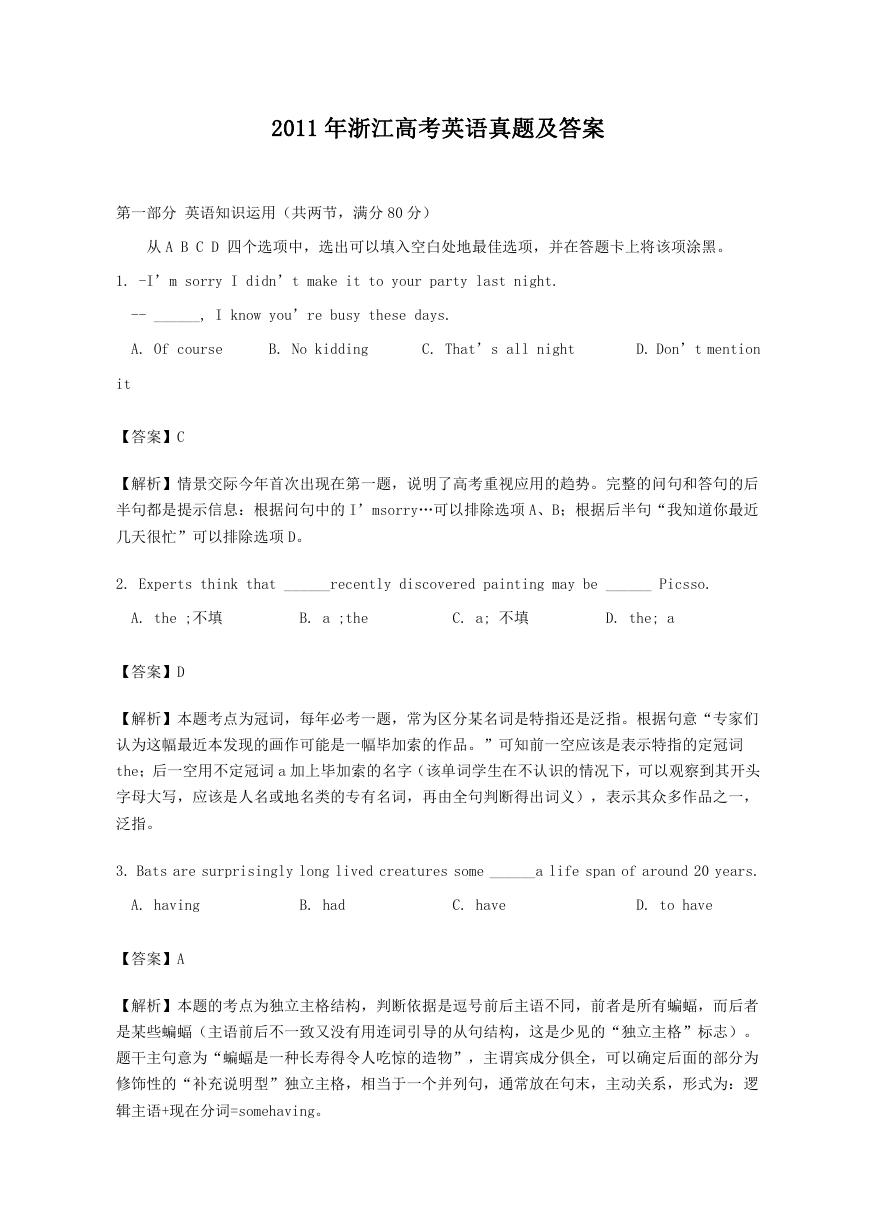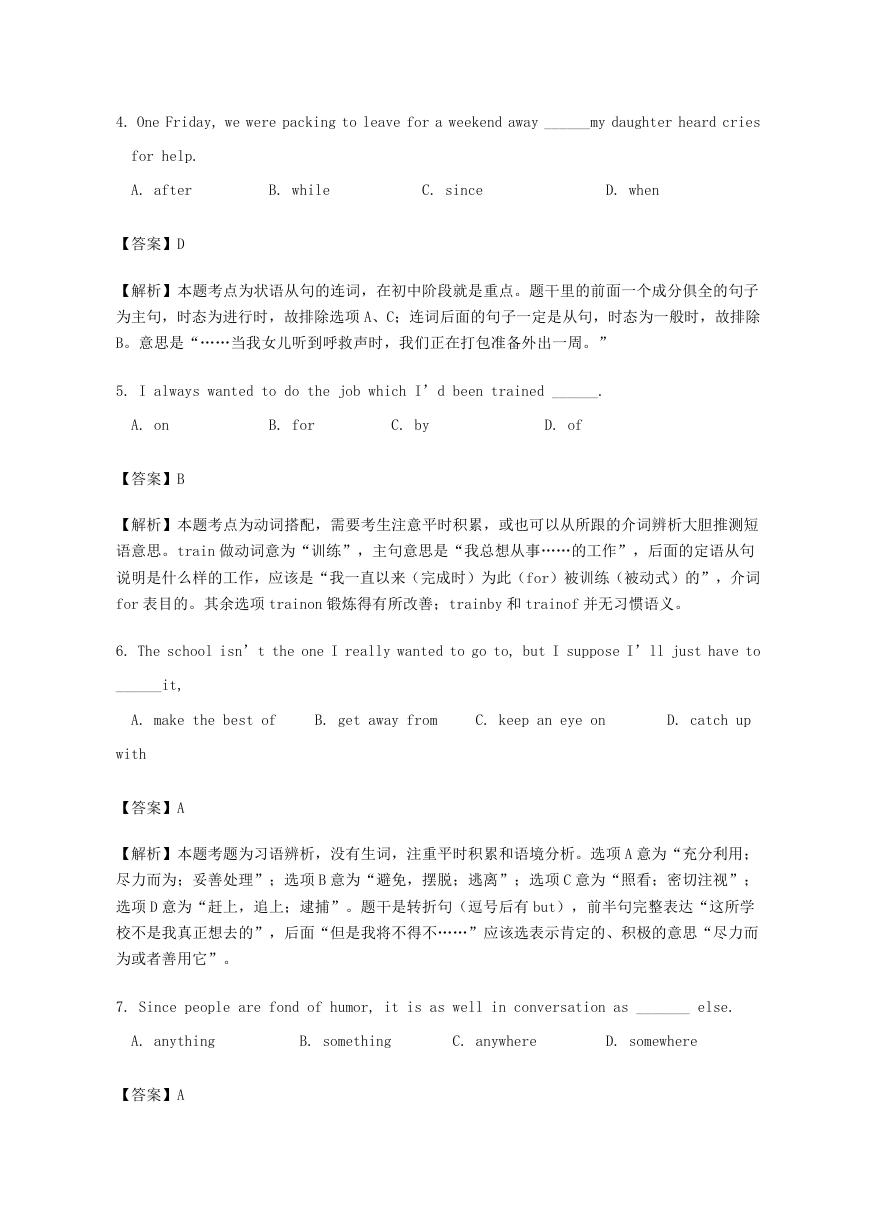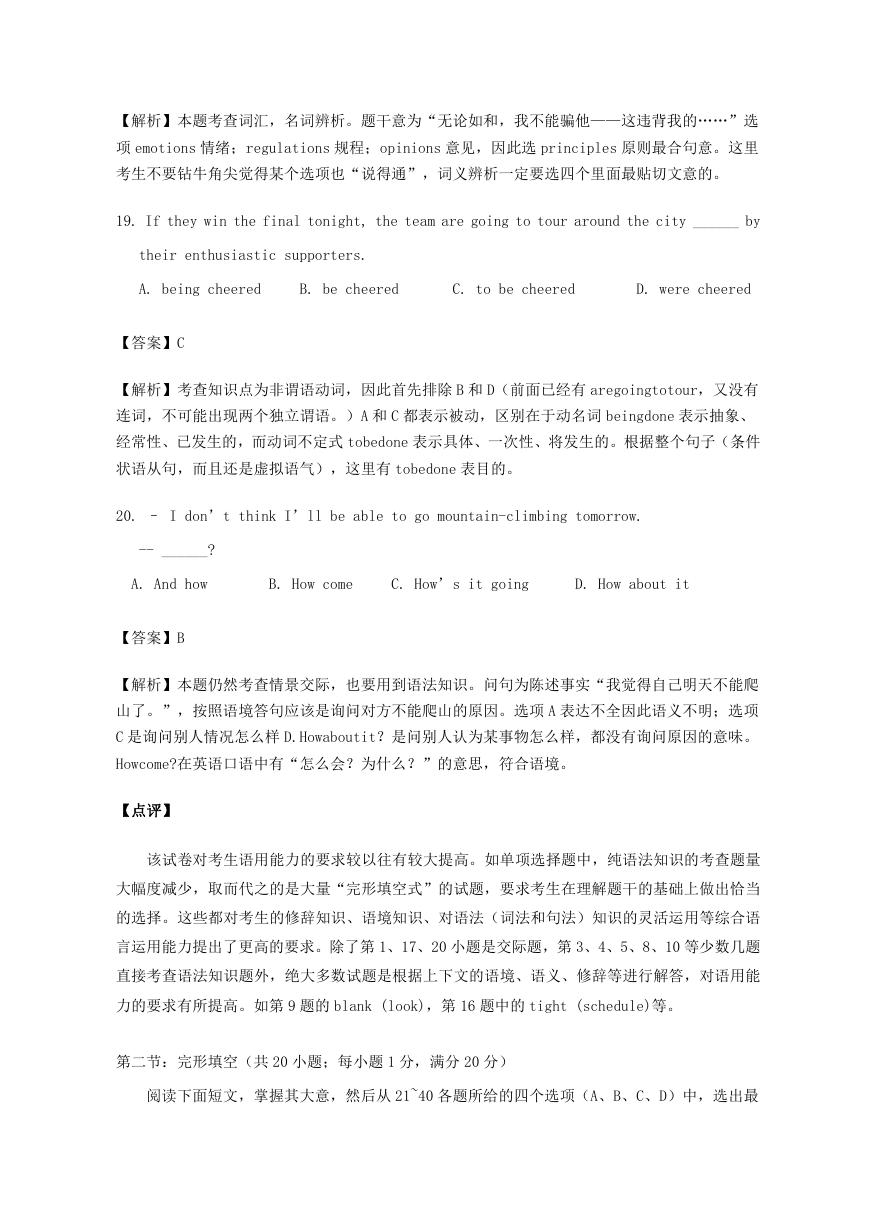2011 年浙江高考英语真题及答案
第一部分 英语知识运用(共两节,满分 80 分)
从 A B C D 四个选项中,选出可以填入空白处地最佳选项,并在答题卡上将该项涂黑。
1. -I’m sorry I didn’t make it to your party last night.
-- ______, I know you’re busy these days.
A. Of course
B. No kidding
C. That’s all night
D. Don’t mention
it
【答案】C
【解析】情景交际今年首次出现在第一题,说明了高考重视应用的趋势。完整的问句和答句的后
半句都是提示信息:根据问句中的 I’msorry…可以排除选项 A、B;根据后半句“我知道你最近
几天很忙”可以排除选项 D。
2. Experts think that ______recently discovered painting may be ______ Picsso.
A. the ;不填
B. a ;the
C. a; 不填
D. the; a
【答案】D
【解析】本题考点为冠词,每年必考一题,常为区分某名词是特指还是泛指。根据句意“专家们
认为这幅最近本发现的画作可能是一幅毕加索的作品。”可知前一空应该是表示特指的定冠词
the;后一空用不定冠词 a 加上毕加索的名字(该单词学生在不认识的情况下,可以观察到其开头
字母大写,应该是人名或地名类的专有名词,再由全句判断得出词义),表示其众多作品之一,
泛指。
3. Bats are surprisingly long lived creatures some ______a life span of around 20 years.
A. having
B. had
C. have
D. to have
【答案】A
【解析】本题的考点为独立主格结构,判断依据是逗号前后主语不同,前者是所有蝙蝠,而后者
是某些蝙蝠(主语前后不一致又没有用连词引导的从句结构,这是少见的“独立主格”标志)。
题干主句意为“蝙蝠是一种长寿得令人吃惊的造物”,主谓宾成分俱全,可以确定后面的部分为
修饰性的“补充说明型”独立主格,相当于一个并列句,通常放在句末,主动关系,形式为:逻
辑主语+现在分词=somehaving。
�
4. One Friday, we were packing to leave for a weekend away ______my daughter heard cries
for help.
A. after
B. while
C. since
D. when
【答案】D
【解析】本题考点为状语从句的连词,在初中阶段就是重点。题干里的前面一个成分俱全的句子
为主句,时态为进行时,故排除选项 A、C;连词后面的句子一定是从句,时态为一般时,故排除
B。意思是“……当我女儿听到呼救声时,我们正在打包准备外出一周。”
5. I always wanted to do the job which I’d been trained ______.
A. on
B. for
C. by
D. of
【答案】B
【解析】本题考点为动词搭配,需要考生注意平时积累,或也可以从所跟的介词辨析大胆推测短
语意思。train 做动词意为“训练”,主句意思是“我总想从事……的工作”,后面的定语从句
说明是什么样的工作,应该是“我一直以来(完成时)为此(for)被训练(被动式)的”,介词
for 表目的。其余选项 trainon 锻炼得有所改善;trainby 和 trainof 并无习惯语义。
6. The school isn’t the one I really wanted to go to, but I suppose I’ll just have to
______it,
A. make the best of
B. get away from
C. keep an eye on
D. catch up
with
【答案】A
【解析】本题考题为习语辨析,没有生词,注重平时积累和语境分析。选项 A 意为“充分利用;
尽力而为;妥善处理”;选项 B 意为“避免,摆脱;逃离”;选项 C 意为“照看;密切注视”;
选项 D 意为“赶上,追上;逮捕”。题干是转折句(逗号后有 but),前半句完整表达“这所学
校不是我真正想去的”,后面“但是我将不得不……”应该选表示肯定的、积极的意思“尽力而
为或者善用它”。
7. Since people are fond of humor, it is as well in conversation as _______ else.
A. anything
B. something
C. anywhere
D. somewhere
【答案】A
�
【解析】考查省略句和句子成分。当句中出现 as…as…“像……一样”时,考生应该确定前后两
个部分是可比较的,也就是是词性或者结构必须相同。这里还原整句
itisaswelcomeinconversationasitisin…else.这里的…必须跟前面的 conversation 词性统一,
再结合句意应该选 A.anything(名词,任何事请)。
8. English is a language shared by several diverse cultures, each of ______ uses it
somewhat differently.
A. which
B. what
C. them
D. those
【答案】A
【解析】考点为高一重点非限制性定语从句,其实考生看到那标志性的逗号就应该有所觉悟。前
面主句完成不缺成分,故后面部分一定为状语或定语从句,根据句意可以判断出后面是对前面
cultures 的解释,则确定是定语从句 cultures 即先行词,排除 B(并非名词性从句)、C(代词,
引导从句不当)、D(副词,词不达意)。
9. The professor could tell by the _____ look in Maria’s eyes that she didn’t understand
a single word of his lecture.
A. cold
B. blank
C. innocent
D. fresh
【答案】C
【解析】本题考查词汇,根据后半句提供的信息选择答案。That 后面的从句完整表达了“她一点
都不懂他的讲座”可得知前面空格处应该填“无知的”,选项 C.innocent(无知的;无辜的)符
合题意。
10. A bank is the place ______ they lend you an umbrella in fair weather and ask for it
back when it begins to rain.
A. when
B. that
C. where
D. there
【答案】C
【解析】主句主系表结构俱全,后面一定是起修饰作用的定语或状语从句,看意思从句是在解释
前面的 place 是一个怎么样的地方,确定是定语从句且先行词即 place。而从句主谓宾结构俱全
也不缺成分,因此用连接副词 where 在从句中代替 place 充当状语。句子的中文直译:银行,是
在天晴之时借伞给你、到了下起雨来之时就催你还回去的地方。
�
11. --- How’s your new babysitter?
--- We ______ ask for a better one. All our kids love her so much.
A. should
B. might
C. mustn’t
D. couldn’t
【答案】D
【解析】本题考点为情态动词结合语境的用法,高一的重点。首句问对方的保姆怎么样,答句的
后面句完整表达了“我们孩子都非常喜欢她。”,那么答句的前半句“我们……要求一个更好
的。”一定是否定才符合语境,排除 A、B,选项 C.musn’t 表示“禁止做……”辞不达意,故而
选 D,“我们不能找到更好的了”。
12. He decided that he would drive all the way home instead of ______ at a hotel for the
night.
A. putting down
B. putting off
C. putting on
D. putting up
【答案】D
【解析】本题考查惯用词组的引申义,注意平时积累。根据句意我们可以知道这里应该是填一个
有“住下”含义的词组,肯定不是这些 put 系列词组的基本义,其中 putup 除了“举起”之意外,
还有“留宿”的意思,符合题意。
13. I’ve been writing this report ______ for the last two weeks, but it has to be handed
in tomorrow.
A. finally
B. immediately
C. occasionally
D. certainly
【答案】C
【解析】考查词汇结合语境的用法。前半句说话人“写报道”用了进行时,再加上后半句是“明
天必须上交”,说明没有写完因此不能是时间点标志的副词 finally(最后)、immediately(立
刻),而 occasionally(偶尔,间或)符合句意。D 选项 certainly(当然)是干扰选项不贴切
句意。
14. Even the best writers sometimes find themselves ______ for words.
A. lose
B. lost
C. to lose
D. having lost
【答案】B
�
【解析】此题考查仍是非谓语动词,或也可以从 Lostforwords.(欲言又止;迷失语言)这一习
语来理解。此题易误选 C,考生可能会将 findsb.todo 跟 findoneself(tobe)done 混淆。根据
句意可知谓语动词是 find“发现”,“即使最好的作家有时也会发现自己……”,四个选项围绕
lose 变化。动词 lose 的基本义是“使……迷路”,引申义是“使……沉溺于”(使动用法容易
被考生忽略),跟逻辑主语 themselves 的关系是被动,只有选项 B 满足。
15. The manager was worried about the press conference his assistant ______ in his place
but, luckily, everything was going on smoothly.
A. gave
B. gives
C. was giving
D. had given
【答案】D
【解析】本题考点为动词时态,四个选项围绕动词 give 变化且没有被动式或者不定式(不是考非
谓语动词了)。主句时态为过去时,从句动作发生在“过去的过去”,因此用过去完成时 hadgiven。
16. My schedule is very ______ right now, but I’ll try to fit you in.
A. tight
B. short
C. regular
D. flexible
【答案】A
【解析】考查词汇辨析,理解句意考生需要读懂词干。schedule 是时间表的意思,but 转折后的
句意是“但我会试着找时间给你(做某事)”因此转折前肯定是时间表本身很满或者很紧张,因
此选 A。
17. --- Can I come and have a look at your new house?
--- Yes, ______!
A. with pleasure
B. I like it
C. I quite agree
D. by all means
【答案】D
【解析】本题考查情景交际用语,结合语境理解。根据语境问句是典型的 CanI…提出祈求而非建
议,故不能选 A(withpleasure 是对建议的回答,“乐意地”),选项 B 和 C 不恰当,选项
D.byallmeans(一定,务必)表示肯定回答,符合句意。
18. Anyway, I can’t cheat him --- it’s against all my ______.
A. emotions
B. principles
C. regulations
D. opinions
【答案】B
�
【解析】本题考查词汇,名词辨析。题干意为“无论如和,我不能骗他——这违背我的……”选
项 emotions 情绪;regulations 规程;opinions 意见,因此选 principles 原则最合句意。这里
考生不要钻牛角尖觉得某个选项也“说得通”,词义辨析一定要选四个里面最贴切文意的。
19. If they win the final tonight, the team are going to tour around the city ______ by
their enthusiastic supporters.
A. being cheered
B. be cheered
C. to be cheered
D. were cheered
【答案】C
【解析】考查知识点为非谓语动词,因此首先排除 B 和 D(前面已经有 aregoingtotour,又没有
连词,不可能出现两个独立谓语。)A 和 C 都表示被动,区别在于动名词 beingdone 表示抽象、
经常性、已发生的,而动词不定式 tobedone 表示具体、一次性、将发生的。根据整个句子(条件
状语从句,而且还是虚拟语气),这里有 tobedone 表目的。
20. – I don’t think I’ll be able to go mountain-climbing tomorrow.
-- ______?
A. And how
B. How come
C. How’s it going
D. How about it
【答案】B
【解析】本题仍然考查情景交际,也要用到语法知识。问句为陈述事实“我觉得自己明天不能爬
山了。”,按照语境答句应该是询问对方不能爬山的原因。选项 A 表达不全因此语义不明;选项
C 是询问别人情况怎么样 D.Howaboutit?是问别人认为某事物怎么样,都没有询问原因的意味。
Howcome?在英语口语中有“怎么会?为什么?”的意思,符合语境。
【点评】
该试卷对考生语用能力的要求较以往有较大提高。如单项选择题中,纯语法知识的考查题量
大幅度减少,取而代之的是大量“完形填空式”的试题,要求考生在理解题干的基础上做出恰当
的选择。这些都对考生的修辞知识、语境知识、对语法(词法和句法)知识的灵活运用等综合语
言运用能力提出了更高的要求。除了第 1、17、20 小题是交际题,第 3、4、5、8、10 等少数几题
直接考查语法知识题外,绝大多数试题是根据上下文的语境、语义、修辞等进行解答,对语用能
力的要求有所提高。如第 9 题的 blank (look),第 16 题中的 tight (schedule)等。
第二节:完形填空(共 20 小题;每小题 1 分,满分 20 分)
阅读下面短文,掌握其大意,然后从 21~40 各题所给的四个选项(A、B、C、D)中,选出最
�
佳选项,并在答题纸上将选项标号涂黑。
Although I love my life, it hasn’t been a lot of fun as I’ve been ill for 28 years.
Music has always been a great love of mine and, in my 20s, when my
21
was more
manageable , I
22
ten years as a professional singer in restaurants, playing and
singing folk songs.
23
that was years ago and times have changed.
24
I live
with mother on a country farm.
Two years ago, I decided that I would need to have some kind of extra work to
25
my disability pension (残疾抚恤金).
26
I needed to sleep in the afternoons, I was
limited in my
27
. I decided that I would consider
28
to singing in restaurants.
My family are all musicians, so I was
29
when I went into our local music store.
I explained that I wanted to sing again but using recorded karaoke music. I knew that
discs were very expensive and I really didn’t have a lot of
30
to get started. And
31
you find only three to four songs out of ten on a disc that you can
32
use.
When I told the owner of the shop about my
33
; he gave me a long thoughtful
34
. “This means a lot to you, doesn’t it?” he said. “Come with me.”
He led me
35
the crowded shop and to a bench with a large professional karaoke
box on it. He placed his large hand 36
on his treasure and said, “I have 800 karaoke
songs in here. You can take your
37
and I’ll record them for you. That should get
you started.”
I
38
. Thanking him, I made a time with him to listen to all the songs and choose
39
that I could sing. I have come full circle with his help.
His
40
still warms my heart and makes me do just that bit extra, when I have the
chance.
21. A. loneliness
B. sadness
C. tiredness
D. sickness
22. A. set
B. enjoyed
C. kept
D. shared
23. A. Gladly
B. Eventually
C. Unfortunately
D.
Surprisingly
24. A. Now
B. Then
C. Sometime
D. Meanwhile
25. A. add up to
B. make up for
C. get rid of
D. take advantage
of
�
26. A. If
B. As
C. Though
D. Before
27. A. movement
B. condition
C. choices
D. positions
28. A. reaching out
B. living up
C. getting on
D. going back
29. A. recognized
B. interviewed
C. found
D. invited
30. A. money
31. A. thus
B. time
B. once
C. energy
D. knowledge
C. seldom
D. often
32. A. actually
B. hardly
C. nearly
D. formerly
33. A. job
B. family
C. idea
D. offer
34. A. face
35. A. over
B. view
B. along
C. look
D. sight
C. towards
D. through
36. A. unhappily
B. lovingly
C. pitifully
D.
gratefully
37. A. pick
B. turn
C. role
D. step
38. A. had to cry
B. ought to cry
C. should have cried
D. could have
cried
39. A. more
B. the ones
C. few
D. the rest
40. A. courage
B. devotion
C. kindness
D. trust
【点评】
2011 年高考英语浙江卷完形填空部分原文节选于读者文摘(Reader'sDigest)澳大利亚版,
考题略有删节,并替换掉原文中超过高考范围的词汇,采取同义词替换的手段使原文表述通畅。
所选文章延续历年出题模式,以记叙文为题材,选取作者在生命中不平凡的阶段受到陌生人帮助
的事实,歌颂和赞扬人间真情和助人的美德。
【解析】
21 题,属于上文提示法,首句中出现 ill,此选项应是 ill 的同义表达,故选 D.sickness。
22 题,属于上文提示法,上句出现病情可以 manageable,所以作者应该是享受那段过去的美
好时光,故选 B.enjoyed。此选项在 2009 年全国一卷完形填空部分第 41 题出现过,且也为正确
选项。
23 题,属于下文解释法,下文出现发生改变,结合首句作者生病,可推出作者表达的是不幸
的情绪,故选 C.unfortunately。此选项为高考完形填空中的的高频选项。
�
















 2023年江西萍乡中考道德与法治真题及答案.doc
2023年江西萍乡中考道德与法治真题及答案.doc 2012年重庆南川中考生物真题及答案.doc
2012年重庆南川中考生物真题及答案.doc 2013年江西师范大学地理学综合及文艺理论基础考研真题.doc
2013年江西师范大学地理学综合及文艺理论基础考研真题.doc 2020年四川甘孜小升初语文真题及答案I卷.doc
2020年四川甘孜小升初语文真题及答案I卷.doc 2020年注册岩土工程师专业基础考试真题及答案.doc
2020年注册岩土工程师专业基础考试真题及答案.doc 2023-2024学年福建省厦门市九年级上学期数学月考试题及答案.doc
2023-2024学年福建省厦门市九年级上学期数学月考试题及答案.doc 2021-2022学年辽宁省沈阳市大东区九年级上学期语文期末试题及答案.doc
2021-2022学年辽宁省沈阳市大东区九年级上学期语文期末试题及答案.doc 2022-2023学年北京东城区初三第一学期物理期末试卷及答案.doc
2022-2023学年北京东城区初三第一学期物理期末试卷及答案.doc 2018上半年江西教师资格初中地理学科知识与教学能力真题及答案.doc
2018上半年江西教师资格初中地理学科知识与教学能力真题及答案.doc 2012年河北国家公务员申论考试真题及答案-省级.doc
2012年河北国家公务员申论考试真题及答案-省级.doc 2020-2021学年江苏省扬州市江都区邵樊片九年级上学期数学第一次质量检测试题及答案.doc
2020-2021学年江苏省扬州市江都区邵樊片九年级上学期数学第一次质量检测试题及答案.doc 2022下半年黑龙江教师资格证中学综合素质真题及答案.doc
2022下半年黑龙江教师资格证中学综合素质真题及答案.doc